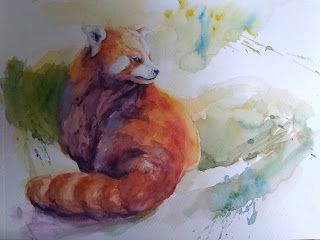Steppenwolf

Hermann Hesse (1877-1962)
1927 in German / 1929 first translated in English
My inexplicable affinity to Hesse reoccurred in a dread time and I grabbed Steppenwolf again--I failed to read some years ago. While reading the first half of the story, a crispy-sharp icy chill penetrated my skin because of its needle-like high precision in describing human nature and striking resemblance to my own. Harry, who describes himself as half a man and half a wolf, a savage animal, suffers from the cacophony of the two kinds in himself. He, helpless bourgeois, longs for the innocent indulgence in bourgeoisie life in his youth, simultaneously detesting its unbearable lightness and vanity. Besides humanities that Hesse wished to preserve, his abomination of war appears to lie beneath the entire story grounded from the author's desperate exhortation to the world for self-reflection beyond politics.
Harry's life makes a sharp turn when he gets to know an mysterious woman and his dark time climaxes when he is invited to a 'magic theatre for mad man only,' where he experiences a series of horrifying fantasy. This magic world is somewhat like the movies, Crash (David Cronenberg) or Eye Wide Shut, and it is very weird to read this kind of fantasy world in Hesse's. Harry's shattered personality is resolved inside the magic theatre: he needed to learn to laugh and realized that all the pieces of life's game were in his pocket. Now he needs to play the game afresh. I hardly get this resolution.
In the author's note in 1961, Hesse explains why this novel was more controversial than his other works: "Partly, but only partly, this may occur so frequently by reason of the fact that this book, written when I was fifty years old and dealing, as it does, with the problems of that age, often fell into the hands of very young readers." Harry is also at his fifty. Should I wait until I reach my fifty to judge this story?
It is somewhat embarrassing to find this phrase in the beginning of the novel, "there is not a single human being, not even the primitive Negro..." I am kind of baffled with how to understand this remark because I am still willing to defend Hesse.



Comments